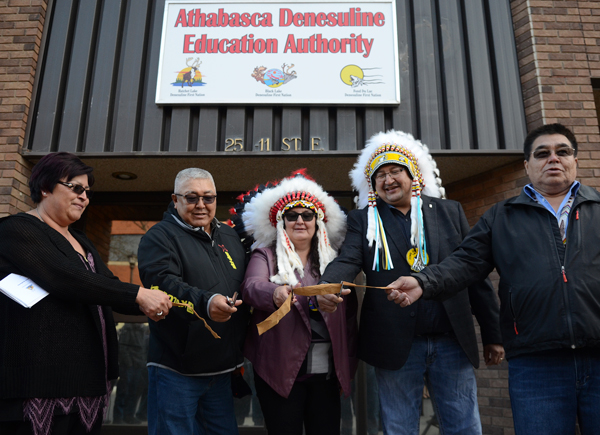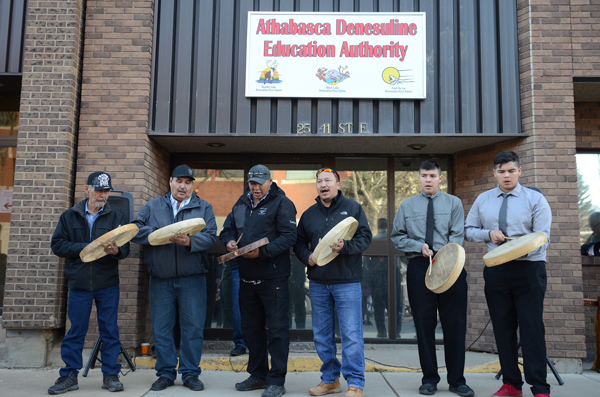
A Denesuline education authority that’s the first of its kind in the province and the first to take advantage of a new federal government initiative celebrated its launch Wednesday.
The Athabasca Denesuline Education Authority (ADEA) is a partnership between three northern Denesuline communities: Black Lake, Fond du Lac and Hatchet Lake. It was sworn into existence over the summer and began operations on Sept. 1. It’s the first education authority to be established under the education transformation initiative of the federal government, which is aimed at improving First Nations education.
ADEA is also the first Denesuline education authority in Canada. Other Indigenous-led education authorities exist in Alberta and the Atlantic provinces, but according to ADEA’s director of education, the authority is the first of its kind in Saskatchewan.
The official launch of the education authority was held at its head office, located on 11th Street East just across from Prince Albert City Hall, on Oct. 23.
“Today is a great day. Today is the start of our future,” said Coreen Sayazie, Chief of Black Lake Denesuline First Nation.
“Education is the cornerstone of development. Education gives us an important start in life, so it must be available, accessible and appropriate within our Athabasca region.”
Hatchet Lake Denesuline First Nation Chief Bart Tsannie emphasized that Wednesday’s celebration was about the next generation.
“It’s about youth taking education in the north,” he said.
“Being in a remote area is not easy. We have to work together. We have to stand together and work for our people. We are not here four ourselves.”
Fond du Lac Denesuline First Nation Chief Louis Mercredi agreed.
“We made history here today. This is a huge accomplishment for our people,” he said.
“Three voices is stronger than one. We need to carry on working together for our nations … for our young people.”
The three Denesuline First Nations began discussions with the federal government on the feasibility of establishing an education authority in January of 2017. At that time, director of education Gerry Guillet was brought in to assist and guide the process of conducting consultations and developing a working committee.

Discussions continued with the communities, leadership and education staff. Two years later, an agreement was reached with the three Athabasca communities to form an authority that could work “towards improving learning opportunities for children, schools and communities,” said Erna Mercredi of Fond du Lac Denesuline First Nation.
In May of this year, they met with Indigenous Services Canada in Ottawa to begin drafting an agreement with the federal government to recognize the education authority. That agreement was signed during treaty days on Aug. 6 in Hatchet Lake, Aug. 7 in Black Lake and Aug. 8 in Fond Du Lac.
Guillet said the education authority will allow the First Nations to work together to secure funding and improve the quality of education in their communities.
“The main issue we have is the educational opportunities for our children in the far north,” he said.
“Isolated communities don’t have the same program offerings or the same opportunities that exist in the south. Funding is an issue and there are many other issues. We want to improve the quality of education in the north.”
Guillet said the vision of a Denesuline education authority was one the communities had for years, but they hadn’t had the opportunity to move forward until now.
In addition to working with the federal government, which is responsible for funding education for Indigenous people, the authority works with the provincial Ministry of Education to follow curricula, form partnerships and offer programs. Education funding that previously would be funnelled to the individual First Nation bands now comes through the authority. The authority will also oversee the operation of the schools, instruction, programs and more.
“It’s historic,” Guillet said. “It’s a major accomplishment.”

He added that he was feeling emotional to see the ribbon cut and the education authority celebration.
“I’m so proud, honoured and just so thankful for our chiefs, our communities, the leadership of our community and all of those wonderful people of the Athabasca basin who have said enough’s enough, we want a good education. Here we are.”
Sayazie said the education authority shows how far the Athabasca Denesuline has come.
“We’ve come a long way from residential schools and day schools,” she said.
“When I went to school, after Grade 9, you were done. But look at our youth. They’re looking up to Grade 12. We wish we had something like (this) in our days. It’s here now. We can have more lawyers, more nurses and bring programs to our communities. We’re proud of who we’ve become, the Athabasca.”

